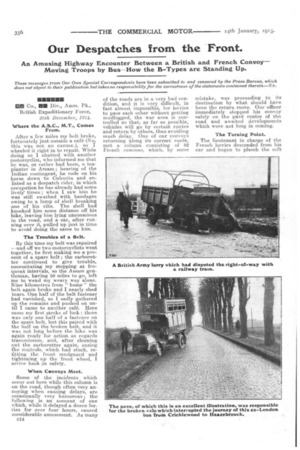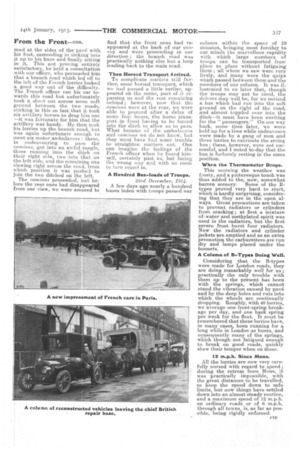Our Despatches from the Front.
Page 4

Page 5

If you've noticed an error in this article please click here to report it so we can fix it.
An Amusing Highway Encounter Between a British and French Convoy Moving Troops by Bus--How the B-Types are Standing Up.
These messages trom Our Own Special Correspondents have been submitted to and censored by the Press Bureau, which does not object to their publication but takes no responsibility for the correctness of the statements contained therein.—En.
MENNEN ME Co., NE Div., Amin. Pk., British Expeditionary Force, 20th December, 1914.
Where the A.S.C., M.T., Comes From.
After a few miles my belt broke, fortunately just outside a cafe (No, this was not an excuse.), so I wheeled it right in to repair. While doing so I chatted with another motorcyclist, who informed the that he was, or rather had been, a teaplanter in Assam ; hearing of the Indian contingent, he rode on his horse down to Calcutta and enlisted as a despatch rider, in which occupation he has already had some lively times ; when I saw him he was still swathed with bandages owing to a lump of shell breaking one of his ribs. The shell had knocked him some distance off his bike, leaving him lying unconscious in the road, and a car, after running over it, pulled up just in time to avoid doing the same to him.
The Troubles of a Belt.
By this time my belt was repaired —and off we two motorcyclists went together, he first making me a present of a spare belt ; the carburetter continued to give trouble, necessitating my stopping at frequent intervals, so the Assam gentleman, having 50 miles to go, left me to wend my weary way alone. Nine kilometres from "home" the belt again broke and I nearly shed tears. One half of the belt fastener had vanished, so I sadly gathered up the remains and pushed on until I came to another cafe. Here came my first stroke of luck ; there was only one half of a fastener on the spare belt, but this paired with the half on the broken belt, and it was not long before the bike was again ready for action as regards transmission, and, after cleaning out the carburetter again, easing the controls, which had stuck, refitting the front mudguard and tightening up the front wheel, I arrive back ,in safety.
When Convoys Meet.
Some of the incidents which occur out here while this column is on the road, though often very annoying when causing delays, are occasionally very humorous; • the following is an account of one which, while it delayed.a dozen lorries for over four hours, caused considerable amusement. As many 014 of the roads are in a very bad condition, and it is very, difficult, in fact almost impossible, for lorries to pass each other without getting mudlogged, the war area is controlled so that, as far as possible, vehicles will go by certain routes and return by others, thus avoiding much delay. One of our convoys returning along its correct. route, met a, column consisting of 82 French carillons, which, by some mistake, was proceeding to its destination by what should have been the return route. Our officer immediately stopped his convoy safely on the pave centre of the road and awaited developments which were not long in coming.
The Turning Point.
The lieutenant in charge of the French lorries descended from his ear and began to plumb the soft
From the Front—con.
mud at the sides of the pavC with his foot, succeeding in sinking into it up to his knee and finally sitting in it. This not proving entirely satisfactory, he held a consultation with our officer, who persuaded him that a branch road which led off to the left of the French lorries looked a good way out of the difficulty. The French officer ran his car towards this road but unfortunately took a short cut across some soft ground between the • two roads, sticking in this so fast that it took six artillery horses to drag him out —it was fortunate for him that the artillery was handy. He then took his lorries up the branch road, but was again unfortunate enough to meet six motor ambulances ; these, in endeavouring to pass the eamions, got into an awful tangle, three running into the ditch on their right side, two into that on the left side, and the remaining one slewing right across the road, from which position it was pushed to join the two ditched on the left.
The cantinas proceeded, but before the rear ones had disappeared from our view, we were amazed to find that the front ones had reappeared at the back of our convoy and were proceeding in our direction ; the branch road was practically nothing else but a loop leading back to the main read.
Then Horsed Transport Arrived.
To complicate matters still further, some horsed transport, which we had passed a little earlier, appeared on the scene, part of -it repassing us and the rest remaining behind ; however, now that the camians were at the rear, we were able to proceed after a delay of some four hours, the horse transport in front having to be forced into the ditch to allow us to pass. What became of the ambulances and camions we do not know, but they must have had some trouble to straighten matters out. One can imagine the feelings of the French officer when he found him'self, certainly past. us., but facing the wrong way and with no room to turn round in.
A Hundred Bus-loads of Troops. 23rd December, 1914. A few days ago nearly a hundred
buses laden with troops passed our
column within the space of 20 minutes, bringing most forcibly to our minds the marvellous rapidity with which large numbers of troops can be transported from place to place without fatiguing them ; all whom we saw were very lively, and many were the quips which passed between them and the members of our column. It was illustrated to us later that, though the troops may not be tired, the drivers may well be, for we noticed a bus which had run into the soft ground on the right of the road, and almost toppled over into the ditch—it must have been exciting for the " passengers!' On our way back, some time later, we were held up for a time while endeavours were made by a gang of men and three lorries to extricate the erring bus ; these, however, were not successful, and I noted to-day that the bus is forlornly resting in the same position.
When the Thermometer Drops.
This morning the weather was frosty, and a picturesque touch was thus added to the, now, somewhat barren scenery. Some of the Btypes proved very hard to start, which is hardly surprising, considering that they are in the open always. Great precautions are taken to prevent radiators or cylinders from cracking ; at first a mixture of water and methylated spirit was used in the radiators, but the first severe frost burst four radiators. Now the radiators and cylinder jackets are emptied and. as an extra precaution the carburetters are run dry and lamps placed under the bonnets.
A Column of B-Types Doing Wen.
Considering that the B-types were made for London roads, they are doing remarkably well tor us ; practically the only trouble with them up to the present has been with the springs, which cannot stand the vibration caused by pave and by the deep holes and ruts into which the wheels are continually dropping. Roughly, with 40 lorries, we average one front-spring breakage per day, and one back spring per week for the fleet. It must be remembered that these lorries have, in many cases been running for a long while in Lndon as buses, and consequently many of the springs, which though not fatigued enough to break on good roads, quickly show their temper when on these.
12 m.p.h. Since Mons. All the lorries are now very carefully nursed with regard to speed ; during the retreat from Mons,. it was practically impossible, with the great distances to be travelled, to keep the speed down to safe limits, but now things have settled down into an almost steady routine, and a maximum speed of 12 m.p.h. on ordinary roads or of 6 m.p.h. through all towns, is, as far as possible, being rigidly enforced. rl 9




















